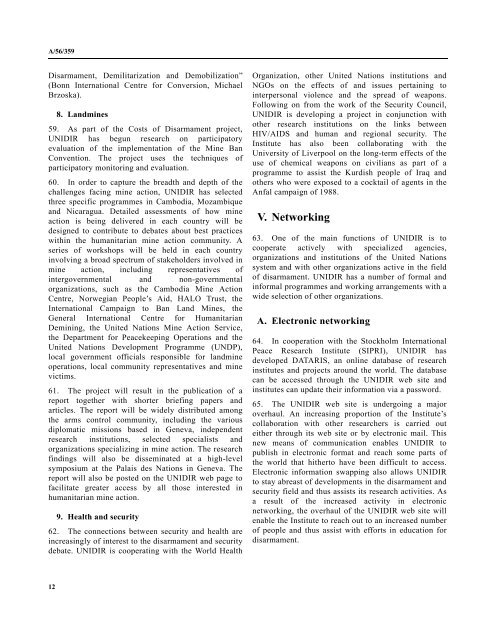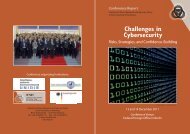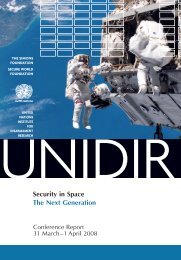General Assembly - UNIDIR
General Assembly - UNIDIR
General Assembly - UNIDIR
You also want an ePaper? Increase the reach of your titles
YUMPU automatically turns print PDFs into web optimized ePapers that Google loves.
A/56/359<br />
Disarmament, Demilitarization and Demobilization”<br />
(Bonn International Centre for Conversion, Michael<br />
Brzoska).<br />
8. Landmines<br />
59. As part of the Costs of Disarmament project,<br />
<strong>UNIDIR</strong> has begun research on participatory<br />
evaluation of the implementation of the Mine Ban<br />
Convention. The project uses the techniques of<br />
participatory monitoring and evaluation.<br />
60. In order to capture the breadth and depth of the<br />
challenges facing mine action, <strong>UNIDIR</strong> has selected<br />
three specific programmes in Cambodia, Mozambique<br />
and Nicaragua. Detailed assessments of how mine<br />
action is being delivered in each country will be<br />
designed to contribute to debates about best practices<br />
within the humanitarian mine action community. A<br />
series of workshops will be held in each country<br />
involving a broad spectrum of stakeholders involved in<br />
mine action, including representatives of<br />
intergovernmental and non-governmental<br />
organizations, such as the Cambodia Mine Action<br />
Centre, Norwegian People’s Aid, HALO Trust, the<br />
International Campaign to Ban Land Mines, the<br />
<strong>General</strong> International Centre for Humanitarian<br />
Demining, the United Nations Mine Action Service,<br />
the Department for Peacekeeping Operations and the<br />
United Nations Development Programme (UNDP),<br />
local government officials responsible for landmine<br />
operations, local community representatives and mine<br />
victims.<br />
61. The project will result in the publication of a<br />
report together with shorter briefing papers and<br />
articles. The report will be widely distributed among<br />
the arms control community, including the various<br />
diplomatic missions based in Geneva, independent<br />
research institutions, selected specialists and<br />
organizations specializing in mine action. The research<br />
findings will also be disseminated at a high-level<br />
symposium at the Palais des Nations in Geneva. The<br />
report will also be posted on the <strong>UNIDIR</strong> web page to<br />
facilitate greater access by all those interested in<br />
humanitarian mine action.<br />
9. Health and security<br />
62. The connections between security and health are<br />
increasingly of interest to the disarmament and security<br />
debate. <strong>UNIDIR</strong> is cooperating with the World Health<br />
Organization, other United Nations institutions and<br />
NGOs on the effects of and issues pertaining to<br />
interpersonal violence and the spread of weapons.<br />
Following on from the work of the Security Council,<br />
<strong>UNIDIR</strong> is developing a project in conjunction with<br />
other research institutions on the links between<br />
HIV/AIDS and human and regional security. The<br />
Institute has also been collaborating with the<br />
University of Liverpool on the long-term effects of the<br />
use of chemical weapons on civilians as part of a<br />
programme to assist the Kurdish people of Iraq and<br />
others who were exposed to a cocktail of agents in the<br />
Anfal campaign of 1988.<br />
V. Networking<br />
63. One of the main functions of <strong>UNIDIR</strong> is to<br />
cooperate actively with specialized agencies,<br />
organizations and institutions of the United Nations<br />
system and with other organizations active in the field<br />
of disarmament. <strong>UNIDIR</strong> has a number of formal and<br />
informal programmes and working arrangements with a<br />
wide selection of other organizations.<br />
A. Electronic networking<br />
64. In cooperation with the Stockholm International<br />
Peace Research Institute (SIPRI), <strong>UNIDIR</strong> has<br />
developed DATARIS, an online database of research<br />
institutes and projects around the world. The database<br />
can be accessed through the <strong>UNIDIR</strong> web site and<br />
institutes can update their information via a password.<br />
65. The <strong>UNIDIR</strong> web site is undergoing a major<br />
overhaul. An increasing proportion of the Institute’s<br />
collaboration with other researchers is carried out<br />
either through its web site or by electronic mail. This<br />
new means of communication enables <strong>UNIDIR</strong> to<br />
publish in electronic format and reach some parts of<br />
the world that hitherto have been difficult to access.<br />
Electronic information swapping also allows <strong>UNIDIR</strong><br />
to stay abreast of developments in the disarmament and<br />
security field and thus assists its research activities. As<br />
a result of the increased activity in electronic<br />
networking, the overhaul of the <strong>UNIDIR</strong> web site will<br />
enable the Institute to reach out to an increased number<br />
of people and thus assist with efforts in education for<br />
disarmament.<br />
12








